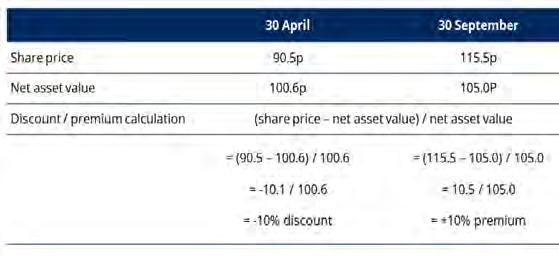
4 minute read
Shopping for discounts
UK investment trusts are trading at the widest discount seen since the financial crisis, according to recent research from Numis. The share price of the average investment trust was trading 13% below its net asset value in 2022, which suggests that there is value to be found in this well-established and diverse part of the UK investment industry. It could, therefore, be a good time for investors to be considering investment trusts as a buying opportunity.
Discounts Explained
Investment trusts are stock market listed companies, so their shares are subject to the forces of demand and supply. A stock market works by setting a price at which demand (the quantity of shares that investors want to buy) and supply (the quantity of shares that investors want to sell) are in equilibrium. As demand and supply change over time, you should expect a share price to move to maintain the balance between these two forces. This is the same for all quoted companies, but with investment trusts there is an additional measure of actual value, against which the share price can be compared. This is known as ‘net asset value’ (NAV for short), and it is essentially the value of all the assets held in that investment trust’s portfolio at a given point in time expressed on a per share basis. Most investment trusts release their
NAV every day, but some – particularly those that invest in less liquid or private assets – release their NAVs less frequently.
The presence of a NAV calculation means that investors get a regular look at the actual value of that investment trust which they can then compare to the prevailing share price to get a sense of how cheap or expensive it is. This is a key differentiator between investment trusts and other ‘open-ended’ investment vehicles such as OEICs, ICVCs and unit trusts, where the value at which investors can buy or sell units is determined explicitly by NAV, and supply and demand are instead balanced by changing the number of units in issue on a daily basis.
When the share price of an investment trust is trading below its NAV, it is said to be trading at a discount. Conversely, if the investment trust’s share price is above its NAV, it is said to be trading at a premium. The chart and table above and on the right should help to illustrate this with a simple example, showing how the share price and NAV of an investment trust interact over time. Put simply, an investment trust’s share price will be influenced by its NAV but over time, it can deviate significantly from it in both directions.

WHY DO INVESTMENT TRUST SHARE PRICES MOVE AWAY FROM NAV?
Broadly speaking, if an investment trust is trading on a discount, it reflects slightly lower demand than supply. This can happen for a number of reasons, such as uncertainty about the outlook for the asset class the trust is invested in, or a lack of interest or liquidity in a particular market or investment theme. By contrast, an investment trust on a premium tends to reflect high demand as a result of elevated investor enthusiasm for a particular characteristic. Sometimes, however, discounts and premiums can arise simply because stock markets are not always totally efficient.
For investment trusts that release NAV data less frequently, a discount or premium may represent the market trying to estimate the change in the value of its assets since the NAV was last released. So, it is always important to try to understand why an investment trust share price has deviated from its NAV before making an investment decision. Nevertheless, a discount does effectively mean that investors have the potential opportunity to buy an asset for less than it is estimated to be worth. It’s bargain hunting time!
WHICH SCHRODERS INVESTMENT TRUSTS ARE CURRENTLY AVAILABLE TO BUY AT A DISCOUNT?

As the chart on the previous page illustrates, all Schroders investment trusts are currently available to buy at a share price below NAV. Discounts (as at 28 February 2023) range from -1.5% on Schroder Income Growth Fund plc, through to -51.0% for Schroder UK Public Private Trust plc
Conclusion
The fact that UK investment trusts have been trading at their widest discount for fifteen years suggests there are currently bargains to be found if investors look carefully. Due diligence is, as always, vital, and investors should do their research before committing to an investment.
We are confident in the investment proposition of each of Schroders investment trusts and would encourage investors to find out more to understand the individual attractions of the Schroders range. The long-term chart at the beginning of this article suggests that the broad level of discount currently seen on UK investment trusts won’t remain this wide forever. Happy shopping!
Find out more about Schroders Investment Trusts
This is a marketing communication.
Past performance is not a guide to future performance and may not be repeated.
The value of investments and the income from them may go down as well as up and investors may not get back the amounts originally invested.
The material is not intended to provide, and should not be relied on for, accounting, legal or tax advice, or investment recommendations. Reliance should not be placed on any views or information in the material when taking individual investment and/or strategic decisions.
Any reference to sectors/countries/stocks/ securities are for illustrative purposes only and not a recommendation to buy or sell any financial instrument/securities or adopt any investment strategy.
Information herein is believed to be reliable but Schroders does not warrant its completeness or accuracy.
For help in understanding any terms used, please visit address www.schroders.com/en/insights/ invest-iq/investiq/education-hub/glossary/
We recommend you seek financial advice from an Independent Adviser before making an investment decision. If you don’t already have an Adviser, you can find one at www.unbiased.co.uk or www.vouchedfor.co.uk
Before investing in an Investment Trust, refer to the prospectus, the latest Key Information Document (KID) and Key Features Document (KFD) at www.schroders.co.uk/investor or on request.
Issued in March 2023 by Schroder Unit Trusts Limited, 1 London Wall Place, London EC2Y 5AU. Registration No 4191730 England. Authorised and regulated by the Financial Conduct Authority







